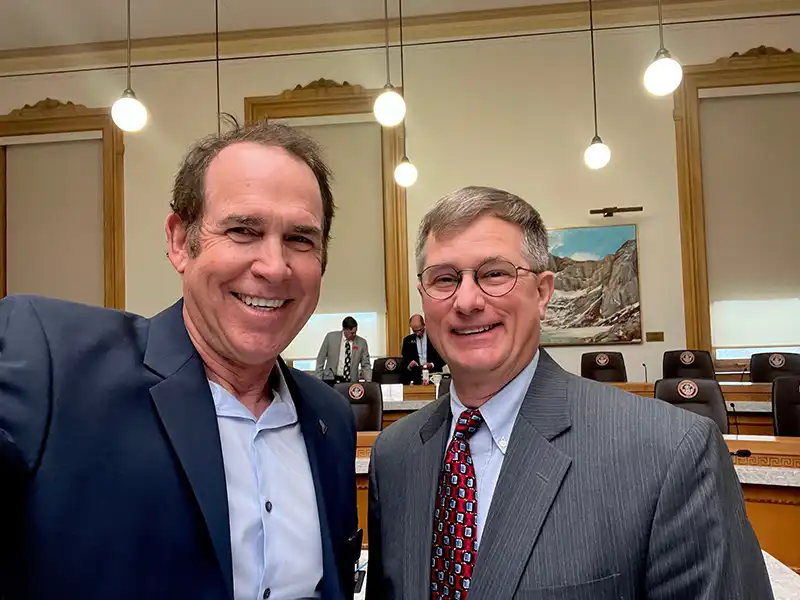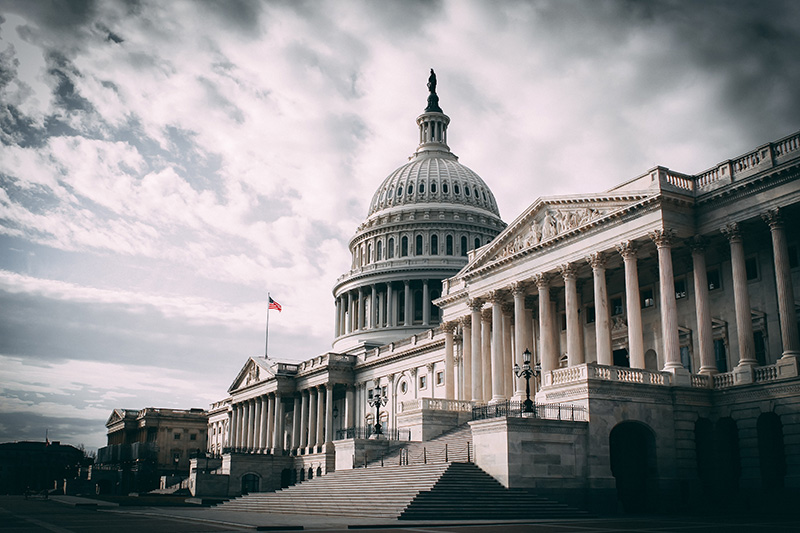
by John | Apr 2, 2024 | Article
Photo: John Mill (right) with Michael Gifford of AGC, before testifying at the State Capitol on February 7, 2024.
The construction industry in 2024 again faces a serious threat from proposed legislation to expand claims under the Colorado Consumer Protection Act (“CCPA”), C.R.S. § 6-1-101 et seq. House Bill 24-1014 would remove the significant public impact requirement for a CCPA claim in current law.
In 1998, the Colorado Supreme Court in Hall v. Walter, 969 P.2d 224 (Colo. 1998), held that to bring a claim under the CCPA a plaintiff must prove, among other things, that the defendant’s alleged deceptive trade practice “significantly impact[s] the public as actual or potential consumers of the defendant’s goods, services, or property.” 969 P.2d at 234. This has been the law in Colorado for over 25 years.
In practice, the CCPA sometimes is used, for example, if a dishonest developer disseminates to the public false information as to the characteristics, uses or benefits of for-sale property through a website or broadly-disseminated marketing materials.
A plaintiff who wins a CCPA claim will be awarded their attorneys’ fees and in some cases treble damages. See C.R.S. § 6-1-113(2). Thus, a CCPA claim is very attractive for plaintiffs’ lawyers and a substantial deterrent to improper conduct.
The proposed legislation, however, is a substantial threat to honest, hard-working construction professionals because if the public impact requirement is eliminated, every private dispute between Party A and Party B could potentially be turned into a CCPA claim with the threat of treble damages and attorneys’ fees. Any plaintiff who alleged that by breaching a contract the defendant engaged in conduct that was “unfair” or “unconscionable” might be awarded treble damages and attorneys’ fees.
On February 7, 2024, John Mill testified against House Bill 24-1014 during a hearing before the Judiciary Committee of the Colorado House of Representatives. John testified on behalf of the Associated General Contractors of Colorado.
The bill was passed by the House Judiciary Committee on a 7-4 vote and later was approved by the full House 41-23. In the Senate, the Senate Judiciary Committee held a hearing on the bill on March 18, 2024 but did not approve the bill.
John and others who follow legislation affecting the construction industry are cautiously optimistic that the bill will not be passed.

by John | May 26, 2023 | Article
In the 2023 legislative session, John Mill testified against a bill that would have had serious negative consequences for the construction industry in Colorado. As introduced, House Bill 23-1192 would have made significant changes to the Colorado Consumer Protection Act (“CCPA”), C.R.S. § 6-1-101 et seq. The CCPA allows a prevailing plaintiff to recover attorneys’ fees and in some circumstances treble damages. The proposed bill would have:
- Eliminated the “public impact” requirement established by the Colorado Supreme Court in Hall v. Walter, 969 P.2d 224 (Colo. 1998). This requires a CCPA plaintiff to prove that the challenged act or practice had a significant impact on the public as actual or potential consumers of the defendant’s goods, services or property. For twenty-five years, this requirement has served to limit CCPA claims to those that involve a deceptive act or practice that broadly impacts the public. The proposed bill would have allowed plaintiffs to bring CCPA claims, with the threat of attorneys’ fees and treble damages, in private disputes between two parties that had no impact on other members of the public.
- Eliminated the requirement in current law that a CCPA defendant acted with a culpable mental state, i.e., acted knowingly or recklessly. This would have turned innocent mistakes—where the defendant did not intend to deceive and did not act recklessly—into CCPA claims.
In sum, the bill would have exposed reputable, honest contractors and developers to punitive CCPA claims carrying the risk of treble damages and attorneys’ fees. This would have increased the risk of construction defect claims, created a bigger disincentive to build condominiums and exacerbated the housing shortage in Colorado.
On February 28, 2023, John Mill testified against the bill on behalf of the Associated General Contractors of Colorado (“AGC”) at a hearing before the House Judiciary Committee. John emphasized that the CCPA changes in the bill would be a step backward from the legislature’s effort in 2017 in House Bill 17-1279 to ease the risk of construction defect claims.
The House passed House Bill 23-1192 with the problematic CCPA provisions. In the Senate, however, the Senate Judiciary Committee voted 3-2 to delete the CCPA provisions from the bill. Before adjourning on May 8, 2023, the legislature passed the bill without the CCPA provisions. The bill as passed, dealing with antitrust, has been sent to the Governor and is expected to be signed into law.
The successful effort to prevent every contract dispute and every construction defect claim from becoming a CCPA claim subject to attorneys’ fees and the threat of treble damages is a big win for the construction industry in Colorado.
John is a member of AGC’s legislative committee. For many years, he has followed, written about and testified on legislation regarding construction defects and other issues affecting the Colorado construction industry.

by John | May 8, 2020 | Article
On February 12, 2020, John Mill testified on behalf of the Associated General Contractors of Colorado, the Denver Metro Chamber of Commerce and the Colorado Competitive Council against Senate Bill 20-138 before the Colorado Senate Judiciary Committee. The bill would increase Colorado’s statute of repose period for filing construction defect claims from a maximum of eight years to a maximum of twelve years which would negatively affect the construction industry. The bill also would not start the statute of limitations period until the claimant knows the cause of the alleged defect, and would allow equitable tolling of the time periods for filing a defect claim. The committee voted to advance the bill to the full Senate after hearing testimony for and against the bill.



